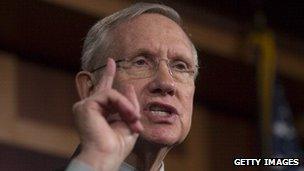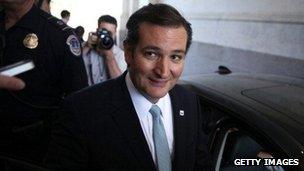Shutdown headache for Republican Speaker John Boehner
- Published

A restive conservative faction has bedevilled House Speaker John Boehner
John Boehner has spent most of his House speakership trying to keep the various factions of his Republican majority together. With the recent government shutdown crisis, Boehner's ability to manage his caucus is once again being tested.
On 26 September, the US was days away from a deadline to pass legislation funding the government. A small group of House Republicans gathered to plot strategy on a conference call with Texas Senator Ted Cruz.
According to a report in the National Review, external, the congressmen - some of the most conservative in Washington - asked Mr Cruz for advice on how to respond to House Speaker John Boehner's proposal to keep the government open.
They hoped to tie it to the uphill battle of defunding President Obama's health care reform. The first-term senator, a darling of the conservative Tea Party movement that gained prominence opposing Obamacare in 2010, told them to oppose it.
The Republicans took the message to the floor of the House, and the speaker's plan died that evening without a vote. Five days later, Mr Boehner was throwing all his efforts behind the drive to end Obamacare, and the government was shuttered.
House rank and file organising against a leadership position - conspiring with a junior member of the Senate, no less - would have been unthinkable in previous congresses.

Justin Amash has voted against his party leadership more than any other member of the House
But this was only the most recent example of the ongoing problem Mr Boehner has had controlling his party caucus.
The rebellious faction hails from solidly conservative, mostly rural areas across the country. They've been called the "weird caucus, external" by Senate Majority Leader Harry Reid and the "suicide caucus, external" by Washington Post columnist Charles Krauthammer, in reference to a disregard for their party's survival. They sometimes refer to themselves as "wacko birds", adopting as their own the derisive label given to them by Republican Senator John McCain.
Time and again - in national security debates, immigration reform, disaster relief, defence authorisations, and even agriculture appropriations - Mr Boehner has found his position undermined by these rebellious legislators. Buoyed by the Tea Party, the backbenchers are unswayed by the kinds of carrots and sticks that kept their predecessors in line.
This group includes Justin Amash of Michigan - who has voted against his party's leadership 126 times, more than any other Republican House member. At the end of last year, he was one of four Republican congressmen stripped of committee seats because of political apostasy.
Undeterred, on 24 July he bucked leadership once again. He led efforts to curtail drastically the warrantless surveillance programme of the National Security Agency (NSA), which failed by only 12 votes.
Steve King of Iowa is another thorn in Mr Boehner's side, working all year to round up votes to block a bipartisan immigration reform bill passed by the Senate - if it comes to the floor of the House. Marlin Stutzman of Indiana helped kill a leadership-backed agriculture bill because it contained funding for food stamps. Scott Rigell of Virginia was one of the first to demand that a reluctant Mr Boehner call the House back from recess in August to vote on strikes against Syria.
Paul Broun of Georgia, who is currently running for a Senate seat, said , externalhe would not vote for legislation that "does not fit the Judeo-Christian biblical principles that our country was founded on".

Senate Majority Leader Harry Reid called intransigent Republicans the "weird caucus"
He has voted against House leadership 84 times, including on a January bill to provide disaster aid for Hurricane Sandy victims.
"The thing that's different about these Republicans is their unwillingness to bargain," says Vanderbilt University public policy professor Bruce Oppenheimer.
"I'm not sure if it's because they lack government experience or they've made such strong promises to their constituencies, but they've put their feet in cement and can't or won't move."
Ryan Lizza of the New Yorker looked , externalat their congressional districts and found that, wacko or not, these representatives are reflecting the will of the voters who sent them to Washington, a decidedly different demographic than America at large.
They "represent an America where the population is getting whiter, where there are few major cities, where Obama lost the last election in a landslide, and where the Republican Party is becoming more dominant and more popular," he wrote. "Meanwhile, in national politics, each of these trends is actually reversed."

Senator Ted Cruz has become the de facto leader of the congressional 'wacko birds'
In effect, writes Philip Bump, external in the Atlantic, there is a third party - with Mr Cruz as its leader - forming in Congress to the right of the Republican Party. This has forced Mr Boehner to operate more like the tolerant head of a coalition government than an iron-fisted speaker of a past era, who could make or break a politician's career at will.
These challenges to Republican leadership will likely continue as long as party members fear a primary opponent from their right more than general election defeat or punishment from the House leadership. Recent Republican-led reforms have limited the leadership's ability to dole out appropriations to reward loyalty, and the power of the Republican establishment to protect its chosen candidates has waned.
The "weird caucus" is only a small segment of the Republican Party on Capitol Hill, but it represents the spear tip of the restive Tea Party base. Its support, or approbation, can mean the difference between a clear field in the next round of primary elections or a battle for political survival.
"Although very few Republicans have been defeated in primaries, there's always concern among some that if they don't at least toe the line, someone will fund a challenger," Mr Oppenheimer says. "It's like a monster in the closet or under the bed for them. Of course, sometimes there really are monsters in the closet."